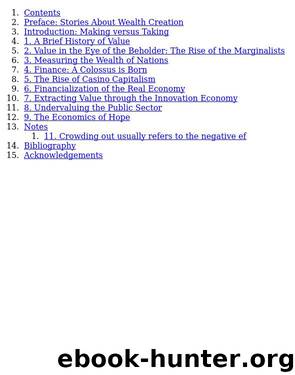The Value of Everything: Making and Taking in the Global Economy by Mariana Mazzucato

Author:Mariana Mazzucato
Language: eng
Format: epub, pdf
Exxon Mobil
$347 bn
$287 bn ($207 bn)
83%
Microsoft
$148 bn
$185 bn ($114 bn)
125%
IBM
$117 bn
$130 bn ($107 bn)
111 %
Cisco Systems
$64 bn
$77 bn ($75 bn)
121%
Procter & Gamble
$93 bn
$108 bn ($66 bn)
116%
Hewlett-Packard
$41 bn
$73 bn ($64 bn)
177%
Walmart
$134 bn
$97 bn ($62 bn)
73%
Intel
$79 bn
$87 bn ($60 bn)
109%
Pfizer
$84 bn
$122 bn ($59 bn)
146%
General Electric
$165 bn
$132 bn ($45 bn)
81%
Figure 21. Top ten stock repurchasers in the US (2004-2012), ranked by the absolute amount of
share buy-backs8
MAXIMIZING SHAREHOLDER VALUE
Share buy-backs boost executive pay. To defend the idea that incentive pay realigns executive and shareholder interests, it is often claimed that share buy-backs maximize shareholder value (MSV) and thus improve the efficiency of companies.9 Financial techniques, it is argued, are a legitimate way for managers to improve productivity and therefore benefit workers and customers as well as shareholders. If a company can earn a higher return at any given time from putting capital to work financially rather than directly selling cars or software, it is behaving rationally and in
the best interests of the business. Having a choice between a financial or a productive use for capital helps to keep the (supposedly) core business of cars or software on its toes because it has to produce returns which compete with financial alternatives. By extension, it is argued that making
it easier for customers to obtain credit, especially to buy your own
products, is a service to ordinary people. There is something to this - but not much. Where did these ideas come from? And do they have validity?
Back in the 1970s, as the economic crisis and stagnation of the decade impaired the performance and profitability of the corporate sector, shareholder dissatisfaction made shareholder returns the principal aim of the corporation. In 1970, Milton Friedman published in the New York Times Magazine an article which became the founding text of the shareholder value movement and, in many ways, of corporate management in general. Titled ‘The Social Responsibility of Business Is to Increase its Profits', Friedman's article advanced the idea that America's economic performance was declining because a cardinal principle of mainstream economics - that firms maximize profits - was being violated. There was no longer any punishment for managers who failed to profit-maximize. Shareholders could not inflict such punishment because they were too dispersed and uncoordinated; and markets could not do so, because listed companies had monopoly power and would not be assailed by new competitors if their costs and prices drifted upwards. Some 1960s economists had viewed ‘managerialism' as potentially good for society, if bosses allowed profit to be eroded by paying better wages to employees, meeting higher environmental or health and safety standards and investing more in new products. Friedman reset the debate by suggesting that bosses were more likely to be sacrificing profit to their own expense accounts and luxury lifestyles; and that even letting costs rise through ‘corporate social responsibility' was fundamentally wrong. The piece spawned an academic literature that would become known as ‘agency theory'.
Friedman's idea was developed further by the University of Chicago-trained Michael Jensen, who was steeped in its ‘free market' ideas.
Download
The Value of Everything: Making and Taking in the Global Economy by Mariana Mazzucato.pdf
This site does not store any files on its server. We only index and link to content provided by other sites. Please contact the content providers to delete copyright contents if any and email us, we'll remove relevant links or contents immediately.
The Secret History by Donna Tartt(16610)
The Social Justice Warrior Handbook by Lisa De Pasquale(11485)
Thirteen Reasons Why by Jay Asher(7782)
This Is How You Lose Her by Junot Diaz(5753)
Weapons of Math Destruction by Cathy O'Neil(5031)
Zero to One by Peter Thiel(4817)
The Myth of the Strong Leader by Archie Brown(4785)
Promise Me, Dad by Joe Biden(4440)
Stone's Rules by Roger Stone(4412)
Beartown by Fredrik Backman(4404)
How Democracies Die by Steven Levitsky & Daniel Ziblatt(4392)
The Fire Next Time by James Baldwin(4337)
100 Deadly Skills by Clint Emerson(4071)
A Higher Loyalty: Truth, Lies, and Leadership by James Comey(4026)
Rise and Kill First by Ronen Bergman(4008)
The David Icke Guide to the Global Conspiracy (and how to end it) by David Icke(3875)
The Farm by Tom Rob Smith(3869)
Secrecy World by Jake Bernstein(3773)
The Doomsday Machine by Daniel Ellsberg(3725)
